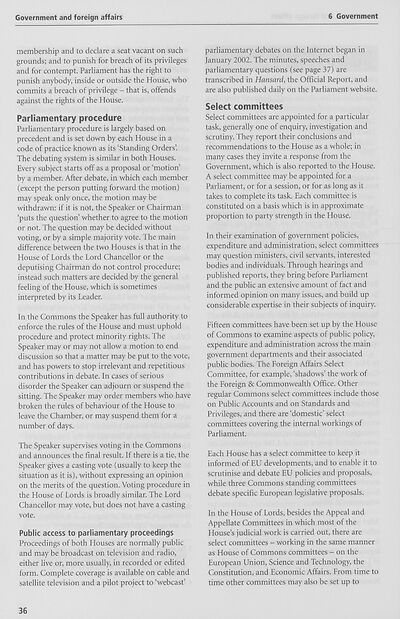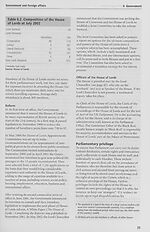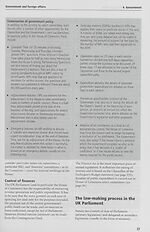Download files
Complete book:
Individual page:
Thumbnail gallery: Grid view | List view

Government and foreign affairs
6 Government
membership and to declare a seat vacant on such
grounds; and to punish for breach of its privileges
and for contempt. Parliament has the right to
punish anybody, inside or outside the House, who
commits a breach of privilege - that is, offends
against the rights of the House.
Parliamentary procedure
Parliamentary procedure is largely based on
precedent and is set down by each House in a
code of practice known as its ‘Standing Orders’.
The debating system is similar in both Houses.
Every subject starts off as a proposal or ‘motion’
by a member. After debate, in which each member
(except the person putting forward the motion)
may speak only once, the motion may be
withdrawn: if it is not, the Speaker or Chairman
‘puts the question’ whether to agree to the motion
or not. The question may be decided without
voting, or by a simple majority vote. The main
difference between the two Houses is that in the
House of Lords the Lord Chancellor or the
deputising Chairman do not control procedure;
instead such matters are decided by the general
feeling of the House, which is sometimes
interpreted by its Leader.
In the Commons the Speaker has full authority to
enforce the rules of the House and must uphold
procedure and protect minority rights. The
Speaker may or may not allow a motion to end
discussion so that a matter may be put to the vote,
and has powers to stop irrelevant and repetitious
contributions in debate. In cases of serious
disorder the Speaker can adjourn or suspend the
sitting. The Speaker may order members who have
broken the rules of behaviour of the House to
leave the Chamber, or may suspend them for a
number of days.
The Speaker supervises voting in the Commons
and announces the final result. If there is a tie, the
Speaker gives a casting vote (usually to keep the
situation as it is), without expressing an opinion
on the merits of the question. Voting procedure in
the House of Lords is broadly similar. The Lord
Chancellor may vote, but does not have a casting
vote.
Public access to parliamentary proceedings
Proceedings of both Houses are normally public
and may be broadcast on television and radio,
either live or, more usually, in recorded or edited
form. Complete coverage is available on cable and
satellite television and a pilot project to ‘webcast’
parliamentary debates on the Internet began in
January 2002. The minutes, speeches and
parliamentary questions (see page 37) are
transcribed in Hansard, the Official Report, and
are also published daily on the Parliament website.
Select committees
Select committees are appointed for a particular
task, generally one of enquiry, investigation and
scrutiny. They report their conclusions and
recommendations to the House as a whole; in
many cases they invite a response from the
Government, which is also reported to the House.
A select committee may be appointed for a
Parliament, or for a session, or for as long as it
takes to complete its task. Each committee is
constituted on a basis which is in approximate
proportion to party strength in the House.
In their examination of government policies,
expenditure and administration, select committees
may question ministers, civil servants, interested
bodies and individuals. Through hearings and
published reports, they bring before Parliament
and the public an extensive amount of fact and
informed opinion on many issues, and build up
considerable expertise in their subjects of inquiry.
Fifteen committees have been set up by the House
of Commons to examine aspects of public policy,
expenditure and administration across the main
government departments and their associated
public bodies. The Foreign Affairs Select
Committee, for example, ‘shadows’ the work of
the Foreign & Commonwealth Office. Other
regular Commons select committees include those
on Public Accounts and on Standards and
Privileges, and there are ‘domestic’ select
committees covering the internal workings of
Parliament.
Each House has a select committee to keep it
informed of EU developments, and to enable it to
scrutinise and debate EU policies and proposals,
while three Commons standing committees
debate specific European legislative proposals.
In the House of Lords, besides the Appeal and
Appellate Committees in which most of the
House’s judicial work is carried out, there are
select committees - working in the same manner
as House of Commons committees - on the
European Union, Science and Technology, the
Constitution, and Economic Affairs. From time to
time other committees may also be set up to
36
6 Government
membership and to declare a seat vacant on such
grounds; and to punish for breach of its privileges
and for contempt. Parliament has the right to
punish anybody, inside or outside the House, who
commits a breach of privilege - that is, offends
against the rights of the House.
Parliamentary procedure
Parliamentary procedure is largely based on
precedent and is set down by each House in a
code of practice known as its ‘Standing Orders’.
The debating system is similar in both Houses.
Every subject starts off as a proposal or ‘motion’
by a member. After debate, in which each member
(except the person putting forward the motion)
may speak only once, the motion may be
withdrawn: if it is not, the Speaker or Chairman
‘puts the question’ whether to agree to the motion
or not. The question may be decided without
voting, or by a simple majority vote. The main
difference between the two Houses is that in the
House of Lords the Lord Chancellor or the
deputising Chairman do not control procedure;
instead such matters are decided by the general
feeling of the House, which is sometimes
interpreted by its Leader.
In the Commons the Speaker has full authority to
enforce the rules of the House and must uphold
procedure and protect minority rights. The
Speaker may or may not allow a motion to end
discussion so that a matter may be put to the vote,
and has powers to stop irrelevant and repetitious
contributions in debate. In cases of serious
disorder the Speaker can adjourn or suspend the
sitting. The Speaker may order members who have
broken the rules of behaviour of the House to
leave the Chamber, or may suspend them for a
number of days.
The Speaker supervises voting in the Commons
and announces the final result. If there is a tie, the
Speaker gives a casting vote (usually to keep the
situation as it is), without expressing an opinion
on the merits of the question. Voting procedure in
the House of Lords is broadly similar. The Lord
Chancellor may vote, but does not have a casting
vote.
Public access to parliamentary proceedings
Proceedings of both Houses are normally public
and may be broadcast on television and radio,
either live or, more usually, in recorded or edited
form. Complete coverage is available on cable and
satellite television and a pilot project to ‘webcast’
parliamentary debates on the Internet began in
January 2002. The minutes, speeches and
parliamentary questions (see page 37) are
transcribed in Hansard, the Official Report, and
are also published daily on the Parliament website.
Select committees
Select committees are appointed for a particular
task, generally one of enquiry, investigation and
scrutiny. They report their conclusions and
recommendations to the House as a whole; in
many cases they invite a response from the
Government, which is also reported to the House.
A select committee may be appointed for a
Parliament, or for a session, or for as long as it
takes to complete its task. Each committee is
constituted on a basis which is in approximate
proportion to party strength in the House.
In their examination of government policies,
expenditure and administration, select committees
may question ministers, civil servants, interested
bodies and individuals. Through hearings and
published reports, they bring before Parliament
and the public an extensive amount of fact and
informed opinion on many issues, and build up
considerable expertise in their subjects of inquiry.
Fifteen committees have been set up by the House
of Commons to examine aspects of public policy,
expenditure and administration across the main
government departments and their associated
public bodies. The Foreign Affairs Select
Committee, for example, ‘shadows’ the work of
the Foreign & Commonwealth Office. Other
regular Commons select committees include those
on Public Accounts and on Standards and
Privileges, and there are ‘domestic’ select
committees covering the internal workings of
Parliament.
Each House has a select committee to keep it
informed of EU developments, and to enable it to
scrutinise and debate EU policies and proposals,
while three Commons standing committees
debate specific European legislative proposals.
In the House of Lords, besides the Appeal and
Appellate Committees in which most of the
House’s judicial work is carried out, there are
select committees - working in the same manner
as House of Commons committees - on the
European Union, Science and Technology, the
Constitution, and Economic Affairs. From time to
time other committees may also be set up to
36
Set display mode to:
![]() Universal Viewer |
Universal Viewer | ![]() Mirador |
Large image | Transcription
Mirador |
Large image | Transcription
The item on this page appears courtesy of Office for National Statistics and may be re-used under the Open Government Licence for Public Sector Information.
| Britain and UK handbooks > UK: The official yearbook of the United Kingdom of Great Britain and Northern Ireland > 2003 > (50) |
|---|
| Permanent URL | https://digital.nls.uk/204923757 |
|---|
| Attribution and copyright: |
|
|---|---|
| Description | Three volumes of 'UK: The official yearbook of the United Kingdom of Great Britain and Northern Ireland', published annually by the Office of National Statistics from 2002-2005. |
|---|---|
| Shelfmark | GII.11 SER |
| Description | Three titles produced by the British Government from 1954-2005 describing 'how Britain worked'. They are: 'Britain: An official handbook' (1954-1998), 'Britain: The official yearbook of the United Kingdom' (1999-2001), and 'UK: The official yearbook of the United Kingdom of Great Britain and Northern Ireland' (2002-2005). These 50 reports provide an overview of Britain's economic, social and cultural affairs, its environment, international relations, and the systems of government. They give an impartial summary of government policies and initiatives, and explain how public services are organised. |
|---|---|
| Additional NLS resources: |
|

